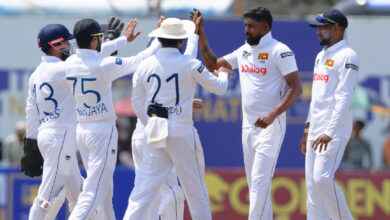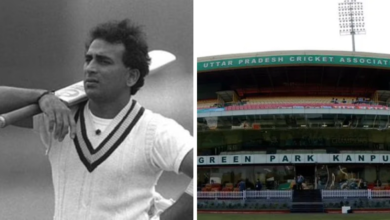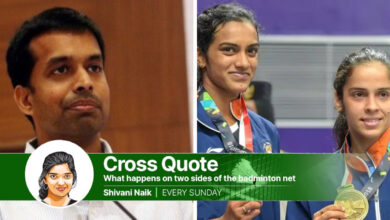Farmer’s son from Pachera village in Madhya Pradesh qualifies for equestrian at Asian Games, a sport dominated army men and the affluent

In the backdrop of a towering South Mumbai skyline shrouded in smog, Raju Singh Bhadoriya clucks and pats a horse that’s bucking and refusing to cooperate. The mare’s head is bowed down, low to the ground. And she wouldn’t do what her rider wants her to do.
‘Steady’, Bhadoriya leans forward and whispers as he signals her to move forward. She, however, doesn’t oblige and tries to throw him off the saddle, instead. The 17-year-old rider, though, stays calm and continues to pat, constantly whispering the words ‘steady’ and ‘move’ while pointing forward until the horse gets into her stride and lopes around the jumping arena of the Mahalaxmi Race Course.
“He’s a horse master,” his coach, Captain Bhagirath Singh, beams from the sidelines.
It’s Bhadoriya’s ability to tackle a horse with a mind of its own that got Bhagirath’s attention seven years ago when he took the farmer’s son from a remote Madhya Pradesh village, Pachera, under his wings. Last week, Bhadoriya achieved a rare milestone: in a sport dominated Armymen – equestrian – the civilian from a humble background qualified for this year’s Asian Games in Hangzhou, China. And at 17, he is one of the youngest in the country to do that.
“What’s a farmer got to do with horses?” Bhagirath, a two-time Asian Games bronze medall, wonders. “Koi vaasta nahi hai… (there is no connection).”
A part of Bhadoriya’s childhood was spent on the family’s farm, where he lent a hand to his father Sujan and was convinced that’s what his future held. That changed sometime in 2016, when – as an 11-year-old – he accompanied his maternal uncle, Lokendra Singh, to the Madhya Pradesh Equestrian Academy in Bhopal.
Equestrian Update☑️
Raju Singh Bhadoria shines at the CCI Two Star Eventing Competition, organized at ASC Bengaluru!
He now qualifies for Hangzhou Asian Games after this win! He also becomes the 6th 🇮🇳 to qualify for Asian Games in Equestrian 🎉
Heartiest congratulations👏 pic.twitter.com/YDlWJDXCVo
— SAI Media (@Media_SAI) February 14, 2023
A groom at the academy who was responsible for taking care of the horses, as well as maintaining the stables and riding equipment, Lokendra introduced Bhadoriya to the ‘surreal new world’. “Forget knowing what equestrian was, I had never ridden a horse before in my life,” Bhadoriya says. “I was 11 when I first sat on a horse during one of the visits with my uncle.”
Like caddies who turn golfers watching the pros play while assing them on the course, the horse groom’s nephew spent hours watching the academy trainees and emulated their technique. On the insence of India international Faraz Khan, he took part in the state’s annual talent hunt and realised his hob could turn into something more serious.
“He was a natural. His boldness, natural sitting position and the methods to handle a horse stood out for me,” says Bhagirath. “Also crucially, badmash ghode ko handle kar leta hai (he can handle a mischievous horse). It’s a God gift.”
But, as Khan had realised, in an expensive and high-maintenance sport like equestrian, talent alone can only take a rider so far. “You need institutional support,” Khan says. “If you see, only faujis had access to equestrian until not very long ago. At the national events, it was a norm to see Armymen sweeping podium finishes and even at the Asian Games, only they went.”
The Army, Khan points out, has big grounds needed for the sport and an established cross-country area. The civilians lacked such space and facilities. More crucially, it was increasingly difficult to buy top-quality racehorses.
Khan says the equestrian landscape started to change in Madhya Pradesh in 2007, when the academy was started the state government. It was part of an overall scheme launched the state’s sports miner, Yashodhara Raje Scindia, which is aimed at nurturing talent in multiple Olympic sports – from shooting to hockey.
“As years passed and our performances improved, the government started providing us with better facilities,” Khan says. The thoroughbred horses were replaced with warmbloods – which are calmer and are able to concentrate better, hence more suitable for events like dressage and jumping – imported from Europe for the promising riders.
Bhagirath says Bhadoriya and Khan, along with another promising rider Bholu Parmar, are training in Europe with horses that were purchased from Belfast, Northern Ireland. Bhadoriya qualified for the Hangzhou Asian Games riding one of the recently-purchased horses, named Matakali, a mare.
“If you want to compete at that level, you need horses of that calibre,” Bhagirath says. “Our long-term plan has been sanctioned and the goal is the World Championship and Asian Games in 2026. The first example of our vision is Raju Singh.”






